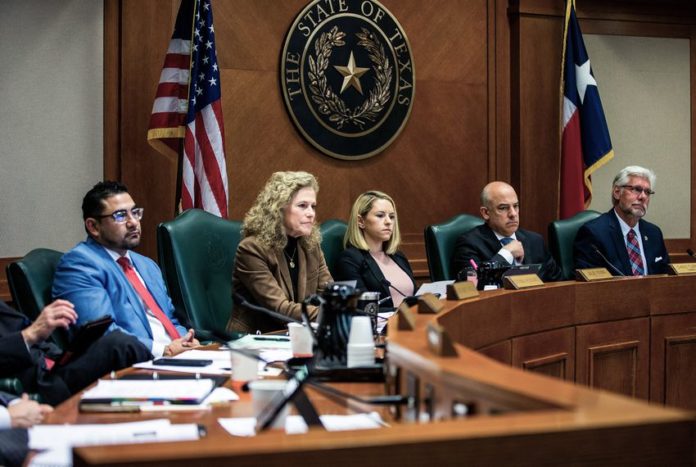Legislation passed last year increases university transparency and strengthens the state’s definition of hazing. But advocates say when it comes to enforcement, kicking fraternities off campus isn’t enough.
Responding to at least 10 hazing-related deaths at Texas universities since 2000, state lawmakers passed a bill last year to crack down on hazing. The House Higher Education Committee convened in the Capitol on Tuesday and asked: Was it enough?
Anti-hazing advocates said the answer is no and that meaningful change will require universities and law enforcement to start holding students involved in hazing personally responsible for their actions, rather than just sanctioning organizations.
“Students report the No. 1 deterrent that will stop hazing, the No. 1 by far, is visible, individual, public accountability,” Jud Horras, president of the North American Interfraternity Conference, told lawmakers.
The bill, which state Sen. Judith Zaffirini, D-Laredo, had been working to pass since 2006, requires increased transparency in how universities report hazing to the public. It also expanded the legal definition of hazing to include coerced consumption of drugs and alcohol.
When a fraternity is found to be guilty of hazing, banning the organization from campus for a few years is the most common remedy. But many say that’s not enough, pointing to Texas Rho, a rogue fraternity that has continued to operate in an unofficial capacity after being stripped of its status by the University of Texas at Austin and Sigma Alpha Epsilon, its national organization.
“Getting down onto the individual level and having those individuals face the consequences of their actions, I think that sends a very powerful message,” Alexandra Cumberland told The Texas Tribune in a phone interview.
Cumberland’s brother Nicky was killed in a car accident in 2018 after a long night of hazing at a retreat for the Texas Cowboys, an elite student organization best known for shooting Smokey the Cannon at football games. The Texas Cowboys are suspended for at least three years after an investigation found rampant hazing.
Despite the new legislation, hazing hasn’t stopped. Just last semester, the University of Texas at Austin put Delta Upsilon on probation until May 2021 for “subject[ing] new members to calisthenics” and encouraging them to collectively drink two handles of liquor during an off-campus retreat, according to the university’s report.
Horras told lawmakers they must encourage local authorities to prosecute — and require schools to report criminal hazing to law enforcement. No one has ever been prosecuted for hazing in Texas, advocates said.
“When, as a fraternity adviser, I talk to my guys, and I tell them, ‘Look, you’ve got to stay within the boundaries of the school’s rules and the state law, or you could be expelled, or you could go to prison,’ they’re going to look at me like I’m lying to them because I am,” Jay Maguire, founder of Parents and Alumni for Student Safety, told The Texas Tribune. “They know that on paper, supposedly you could be expelled and supposedly you could be prosecuted, but the odds are really, really against that ever happening.”
Advocates said universities need to focus on ensuring investigations are conducted by impartial third parties and educating middle and high school students about the dangers of hazing before they step onto a college campus.
Maguire said that university presidents also face pressure from donors to go easy on individuals involved in hazing. One solution, which he recommended to the committee, is to appoint a hazing czar or ombudsman with no concern for those “political considerations” to handle all investigations, similar to how university Title IX offices operate.
Margarita Arellano, Texas State University dean of students, took exception to the implication that her decision-making could be swayed by outside forces.
“As an administrator working 31 years at a university, I’ll tell you, nobody has influence on me, personally,” she said. “Yes, universities may be pressured, and some maybe more than others, but it’s very complicated because sometimes the national organizations may not be doing what the university’s asking them. We’re not on the same page. Sometimes we cancel the organizations and the national doesn’t cancel the organization.”
Horras and Arellano both pointed out the need to educate students about hazing before they’re thrown into it head first freshman year. Horras said bullying and hazing are related.
“The mean girls in eighth grade are the ones who are [hazing] in college,” he added.
UT has begun to tackle this problem with a Houston-based pilot program run out of its Sorority and Fraternity Life Office. The program is working to give teenagers and their support systems the vocabulary to talk about hazing and the tools to address it.
“How do we make sure [sororities and fraternities] recapture their values — values intended when Greek organizations were created, which were about scholarship, about philanthropy, and about brotherhood and sisterhood?” Arellano said. “Some of those values are no longer there.”





















